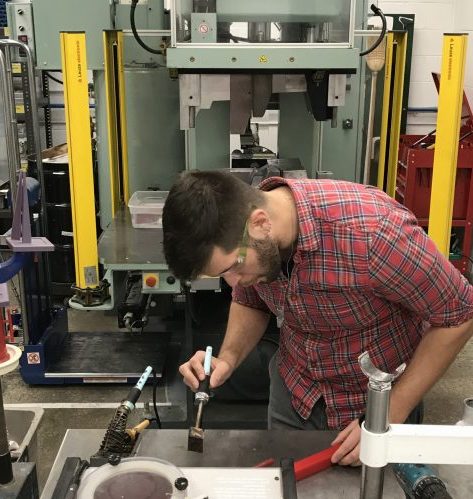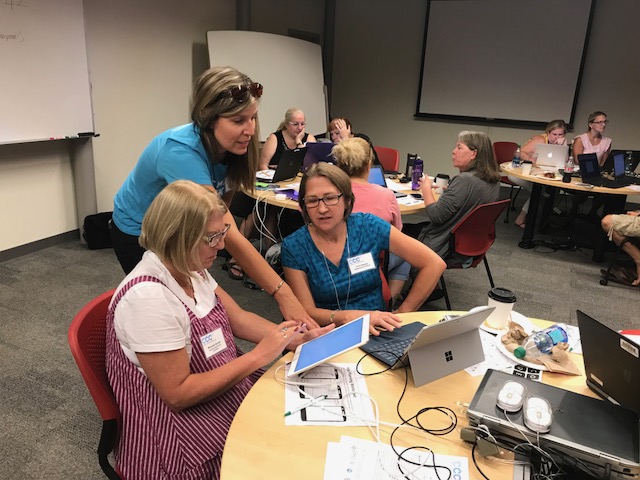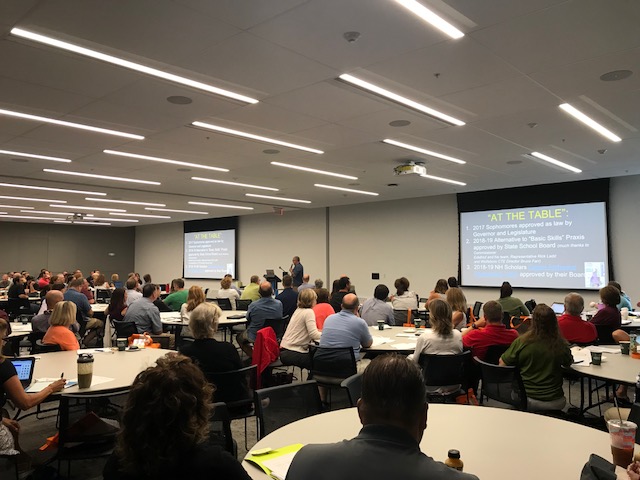
Oct 22, 2018 | Article
On October 9, the New Hampshire Joint Engineering Societies (NHJES) held its 12th Annual Conference, which featured subject matter experts on topics like Artificial Intelligence, ReVision Energy, Climate Adaptation in Dover Master Plan and more.
For the second year in a row, the conference also included secondary teachers and students, the latter of whom displayed their own projects and presentations.
“This platform has became an outlet for students to experience learning outside of the classroom,” said NHEJS Board Member Frank Xydias of the Milford High School & Applied Technology Center. “It also gives students the chance to work alongside of engineers and meet engineers that can become a positive influence in their career development.”
Members in NHEJS include the New Hampshire Society of Professional Engineers, American Council of Engineering Companies, American Society of Civil Engineers – NH Section, IEEE – New Hampshire Section, Society of Women Engineers, Southern New Hampshire, Structural Engineers of New Hampshire.
In hosting the conference and inviting students and teachers, Xydias said they take a meaningful step toward achieving their mission “to provide education, leadership, and support for the profession of engineering across all disciplines of practice.”
As far what he hopes the public can better understand about engineering, Xydias cited its ubiquitous nature.
“There are over 40 type of engineering degrees and a multitude of subcategory professions,” he said. “An engineering career can lead to many other professions.”
He also noted that engineering need not be viewed as an onerous subject, either. At its core, he said, engineering is about people who like to problem solve.
“As young children, we are trained to become engineers,” he said.
He cited various toys as examples in which children learn to become engineers. These examples included Play-Doh, toy models, LEGOs, checkers, chess, and other games.
Play-Doh, for example, uses manufacturing engineering.
“It uses vocabulary and actions of injection molding like ‘extrude, form, press, fit, mold, gate, sprue’ and similar terms,” he said. “As an educator of engineering, I bring back wonderful childhood memories of building LEGOs, using play-doh, or playing checkers back into the classroom. These recollections can be a powerful way to make connections for students that keep them engaged and learning.”
As for the subjects discussed at this year’s conference, Xydias said the experts provided deeper insight into each one. Jim Issaak of IEEE, for instance, talked about recent developments in Artificial Intelligence and its emerging role in our professional and personal lives.
Frank Edelblut, commissioner of the NH Department of Education, presented “The Role of Education in the Tech Era.”
“It was a great conference that helps set the stage for what’s next in engineering,” said Xydias.
As for what is next, Xydias acknowledged he is not sure, which he said makes the engineering field so interesting.
“Kids in kindergarten this year graduate in 2031,” he said. “The careers that students will be going into have not yet been developed, and STEAM and engineering careers are the foundation of these changing careers…We might find ourselves in scenes from Star Trek, 3d printing our food, flying to the store, or working with some other futuristic AI.”

Oct 8, 2018 | Article
An entire month of celebrating manufacturing in New Hampshire!
For the last 5 years, New Hampshire Manufacturing Extension Partnership with help from the New Hampshire Department of Business and Economic Affairs, the Business and Industry Association, the New Hampshire High Tech Council, the Community College System of New Hampshire, the New Hampshire Department of Education and many other partners have organized Manufacturing Month.
What is it all about?
Throughout the month of October, high school and middle school students will be going on field trips to visit local manufacturers. During those trips, manufacturers will have the opportunity to show students how cool manufacturing is and inform them of all the in-demand careers their field has to offer. Students will have the chance to interact with employees and get an up-close look at the ins and outs of manufacturing in New Hampshire. For manufacturers, it opens up a new supply of talent to help them build the future skilled manufacturing workforce.
NH CTE’s and community colleges will also schedule open houses in the month of October for students and members of the community. The schools will have the opportunity to show off their advanced manufacturing programs, facilities, and machines. Potential students will learn about all of the educational options in advanced manufacturing and will leave convinced that staying local and building a future here in New Hampshire is the best career move for them.
What did the students say?
Students had this to say about their visits to manufacturers:
- Very interesting to see how the facilities worked and how the machines all worked together to make the product.
- The field trip was highly informative and interesting. It gave me a broad variety of different things
manufactured right in our local area.
- The field trip was really great! I learned a lot and can honestly say it’s one of the best field trips that I’ve been on with the school.
- It was eye-opening in the sense that I could be doing something like this in the future.
To participate: Contact, Jill Duddy at (603) 226-3200 or jilliand@nhmep.org
Schools – Click Here Manufacturers – Click Here

Sep 25, 2018 | Article
While technology is often seen as an educational end, one objective behind the Creative Computing Challenge (CCC), a five-year program funded by the National Science Foundation, is to highlight its use as a teaching tool.
This objective was met earlier this year on two occasions at Salem High School Career and Technical Center in which teachers from multiple CTE centers convened to discuss Thunkable. An online platform that allows users to build a mobile app for either Android or iOS devices, Thunkable was used by many students in computer science classes this past spring.
According to Heather Drolet, a technology integrator at Christa McAuliffe School in Concord, these teacher workshops provided a unique learning opportunity for teachers.
“Many of the teachers had experience already with MIT App Inventor 2, a program that actually inspired Thunkable, but can only be used to build Android apps,” said Drolet, who facilitated a Thunkable workshop in July.
Selected by the New Hampshire Charitable Foundation as 2017-2018 recipient of the Christa McAuliff Sabbatical, Drolet spent the past year working with many 5th grade classes and teachers around NH.
“Because they had already implemented App Inventor with their students and loved it, they were looking for a way to incorporate iOS app development because of the high percentage of their students with iPhones,” she added.
She said these workshops provided a forum for teachers to discuss and compare the two programs. She said what resulted was excitement at the prospect of having a new tool in their toolboxes that they could use to bring “real-world, authentic learning experiences to their students.”
“They asked a lot of practical questions as we built sample apps in Thunkable,” she said. “We also had a robust discussion on strategies for implementation of the tool.”
According to Drolet, teaching app development is not just a great way to introduce students to the field of computer science, it makes learning come alive for students.
“We all live in a connected world, and classrooms are no longer confined to four walls,” she said.
As an example, she said a student could build an app that allows users to find and donate to local food pantries.
“This not only gives the students a new skill in app development and a hands-on learning experience–math, social science, and business/marketing standards–it builds relationships with the local community,” she said. “Lending purpose to schoolwork is quite engaging for students. It draws in our reluctant and disengaged students and quite often levels the playing field.”
Inclusion is another benefit from this use of technology.
“Populations that are traditionally underrepresented in the field of computer science–females and minorities, for instance–are given an equitable learning experience that amplifies the positives of human interaction with technology,” she said.
According to Chris Dodge, director of Salem High School Career and Technical Center, the workshops help to underscore changes in computer science in recent years. In particular, he cited numerous changes at their school.
“Students are now getting exposure to computer programming as early as first grade and units in computer science are now integrated in grades 1-8 within the Salem School District,” he said. “We have advanced our thinking, approach and commitment to a K-12 STEM curriculum in just 3 short years.”
This commitment resulted in part from him taking a closer look at the programming they previously offered in a concerted effort to “up their game.”
“[We want] students that will be entering our programs to have a more developed skill set in the areas of engineering and computer science,” he said. “The adoption of this K-12 curriculum is a natural fit for teaching the next generation science standards and enhancing our elementary science curriculum.”
At the heart of these changes and enhancements is computational thinking, which Dodge said is not unlike the scientific method or engineering process.
“It is using and applying logical thought to identify and systematically solve a problem,” he said. “This process involves identifying a problem to solve, developing a solution through the use of algorithms, logical process and trial and error, and ultimately applying the solution on a broader scale.”
He said the value in nurturing computational thought cannot be over-emphasized.
“It moves students beyond the rote and mundane and challenges them to struggle with the challenge of problem solving and real-world application.”
This work is supported by grant #IIA-1348352 from the National Science Foundation.
This is the third of a multi-part series on CCC and the relevance of computational thinking in the classroom and industry in NH.

Sep 24, 2018 | Article
On September 12, Frank Xydias, high school engineering teacher at Milford High School, received the iRobot -STEM -MVP teacher of the year award at Fenway Park, an experience he described as “heartwarming.”
“I stood on the field with my peers for a good part of an hour,” he said. “We were all in awe and star-struck to see the players up close…For that hour, I experienced what every major league athlete, performer, and actor/actress experiences.”
Receiving the accolade because a former students nominated him with a letter, Xydias said the experience was made possible in part by a school with a philosophy that enables students to discover different career pathways.
In a CTE environment, he said he hopes the general public begins to recognize the nature of these pathways, which are no longer just labor-intensive. Rather, many of them focus on advanced technology and skill sets that require college training.
“Students in CTE no longer go ‘right to work,’” he said. “These students ‘go to college.’ CTE prepares students for essential work ready, career-ready skills and helps them develop an essential understanding of their chosen career pathway.”
He cited a close partnership between CTE programs and community colleges, too.
“CTE schools partner with all 7 community colleges and have community partners to help make the programs successful,” he said. “These community partners recognize the value in education and continuing education for a diminishing workforce.”
Julia Fretwell of Hitchiner Manufacturing Co., Inc., which has partnered with Milford High School for a number of years, said they strongly believe in CTE.
“CTE programs offer students in high school the opportunity to experience their potential career path both in and outside of the classroom,” she said. “Outside of the classroom, students are exposed to their potential career path through field trips, job shadows, and internship experiences.”
These experiences, she said, coupled with those in classroom, provide students with a jumpstart on their careers.
“Students in CTE have the ability to graduate with a strong foundation of knowledge in their fields with the potential to earn college credit while in high school,” she said. “From an employer perspective, CTE provides students with necessary skills needed in New Hampshire’s workforce as they graduate high school.”
For engineering students who complete Milford’s CTE complete, they graduate with 13 college credits and a list of network connections from the Society of Manufacturing Engineering and local companies from the Program Advisory Committee.
“These students are well-rounded and use the most up to date materials and trends in our career fields,” Xydias said.
While excited that he received recognition at Fenway Park, Xydias is more enthused at the growth and relevance of CTE.
“30 years ago, there were only two types of career collars that were recognized–blue and white,” he said. “Blue collar became synonyms with vocational and labor intensive and eventually CTE. CTE, though, is not blue collar any longer. We are a rainbow of collar colors and we wear many hats.”
In moving away from the concept of ‘blue and white’ regarding career development. Xydias said CTE fully embodies the spectrum of career development.”
“CTE provides specialized training that requires educational planning for career and college advancement,” he said. “If you were to go to LinkedIn, you would be amazed at diversity of collar colors today.”

Sep 13, 2018 | Article, Professional Development
 Educators shared best practices and honed their skills to improve services provided to students in New Hampshire.
Educators shared best practices and honed their skills to improve services provided to students in New Hampshire.
PLYMOUTH, NH – More than 130 educators that serve nearly 10,000 career and technical education (CTE) students in New Hampshire attended a professional development and networking conference in mid-August. The New Hampshire Department of Education co-sponsored the summer conference, the second of its kind in the state, which was expanded in 2018 from two to three days. The conference, according to organizers, supported the state’s demand for increased student participation in CTE programming and provided educators and administrators the opportunity to collaborate with their peers.
Speakers included Frank Edelblut, the commissioner of the New Hampshire Department of Education, state Sen. David Watters, D-Dover, and Dr. Kathleen C. McCabe, who helped facilitate work developing professional communities of practice around the state.
In New Hampshire, there are 26 CTE centers and satellite programs. Students attending CTE classes and programs gain technical skills in a variety of high wage, high demand career pathways that support the state’s labor markets. The Granite State currently has record-low unemployment as well as solid economic growth. Combined with the retirement of baby boomers, many good jobs are not being filled. The CTE community supports young people interested in these career pathways.
The NH-CTE Summer Conference provided a forum in which educators could come together with industry leaders, post-secondary partners, and other experts in the field of education to share best practices and hone their skills to focus on continual improvement of the services provided to students.
Industry partners at the conference included NH’s Sector Partnership Initiatives, the NH Lodging and Restaurant Association, Associated Builders and Contractors NH/VT, Methuen Construction, Silvertech, Graphicast, and TurboCam.
Attendees also toured the Plymouth Regional Applied Technology Center renovation project and gathered ideas for their own future renovation projects.
Conference attendees noted that the event was very organized and it helped educators connect and share resources.
Conference resources are available in this NH-CTE Summer Conference 2018 Google doc.
For more information about the conference, contact Courtney Ritchings at Courtney.Ritchings@doe.nh.gov or 603-271-3809.

Sep 7, 2018 | Article
First and foremost and speaking for our our NHCTA / NH-CTE Board, we want to affirm our pride in–and admiration of–the NH-CTE community. It is an exciting time and certainly a moment to promote ourselves as a powerful and worthy option for high school students.
Key Theme
If there was one big picture theme for this academic school year, it would be: college and career readiness. For years as a culture, this concept has really been disproportionately focused on metrics aligned to “college readiness” rather than “career.” This model is not sustainable: not enough young adults are not making the gains they need to gain career employment; nor are enough businesses benefiting from a diverse and prepared workforce.
The state, and the country for that matter, has awoken–much to the credit of the CTE community (schools, post-secondary, industry, students, parents, friends.)–to realize that a more strategic and balanced approach to college and career readiness is needed. CTE is well positioned at this crossroads given our strategic initiatives over the past decade or more.
Your NHCTA / NH-CTE Board has been working hard to keep us “at the table” and promote our relevance (and agenda) to the state’s overall educational model. It is a worthy endeavor led by volunteers who consider themselves passionate stewards of NH-CTE.
Highlights
- The NH State School Board approved an alternative ALT IV route that does not require the Praxis, but is instead based on a candidate’s licensure and/or industry certification to demonstrate their “basic skills.” (special thanks to Bruce Farr and Barney Keenan)
- The NH Scholars State Board approved a fourth state designation called “Career Pathway,” which is almost ready for a pilot run this year. The criteria aligns beautifully to CTE priorities.
- The promotion of work-based learning (WBL) statewide through a partnership with the National Governors Association.
- The governor and legislature’s continued support of CTE center renovations: Salem and Dover opened this year, and Rochester, Alvirne, and Plymouth are in the works.
- Sustained efforts to partner with groups like the ELO network, The Alliance, NHCBE, and CCSNH to promote mutual interests to students and parents.
- The Bureau of Career Development support of upgrades to our competencies.
Our Board sponsoring statewide NH-CTE awards for excellence. We will celebrate key players, including teachers and industry partners to career counselors.
- The NH Senate continuing to support the SB190 CTE Focus Workgroup to create the most supportive environment, including through RSA’s, for CTE to flourish.
I offer a virtual shout out to the Commissioner of Education Frank Edelblut, Deputy Commissioner Christine Brennan and DOE division heads Heather Gage, Caitlin Davis and Michael Seidel. In addition, I also thank two staff members, Bill Ross and Amanda Noyes from credentialing, each of whom have been extremely professional in their collaboration with NH-CTE. This is a positive time for us and their genuine support for CTE has been remarkable.
Challenge
The one area in which we challenge our community is developing a comprehensive approach to cluster-based program development. This goes beyond professional development – it is team focused. We have had our fits and starts over the past few years and not enough gains have been made.
We are open to all ideas that help NH-CTE teachers create quality networks based on best practices to improve student performance. I credit the staff of the Bureau of Career Development and consultant Dr. Kathy McCabe for their collective efforts this summer at the 2nd annual NH-CTE conference. We still, however, have have a ways to go and the path is very tough to define.
Looking Ahead
Finally, our NHCTE / NH-CTE Executive Director Christine Carr has entered her 2nd year. She took a year to travel throughout and learn our community, and now she has come forth to author and implement a new focused vision for NH-CTE.
She is certainly challenging us. We will share details soon, but I would summarize that her proposal, which is supported by our board, is both bold and logical. This is a time for us to be ambitious.
I hope 2018/19 is your finest year. Please feel free to contact me or our board with any questions, concerns or (even) a willingness to be a part of our efforts. Also contact us at media@nhcta.org with any great story leads. The NH-CTE story needs to told regularly!
Steve Rothenberg, NHCTA/NH-CTE President
srothenberg@sau8.org
NHCTA / NH-CTE Board
President Steve Rothenberg, Concord
Vice President Chris Dodge, Salem
Treasurer Al Smith, Littleton
Secretary Jen Haskins, Pinkerton
Bruce Farr, Wolfeboro
Amanda Bastoni, Nashua
Bonnie Ackerman, Newport
Lisa Danley, Dover
Executive Director Christine Carr
Administrative Support: Debbi Cox







